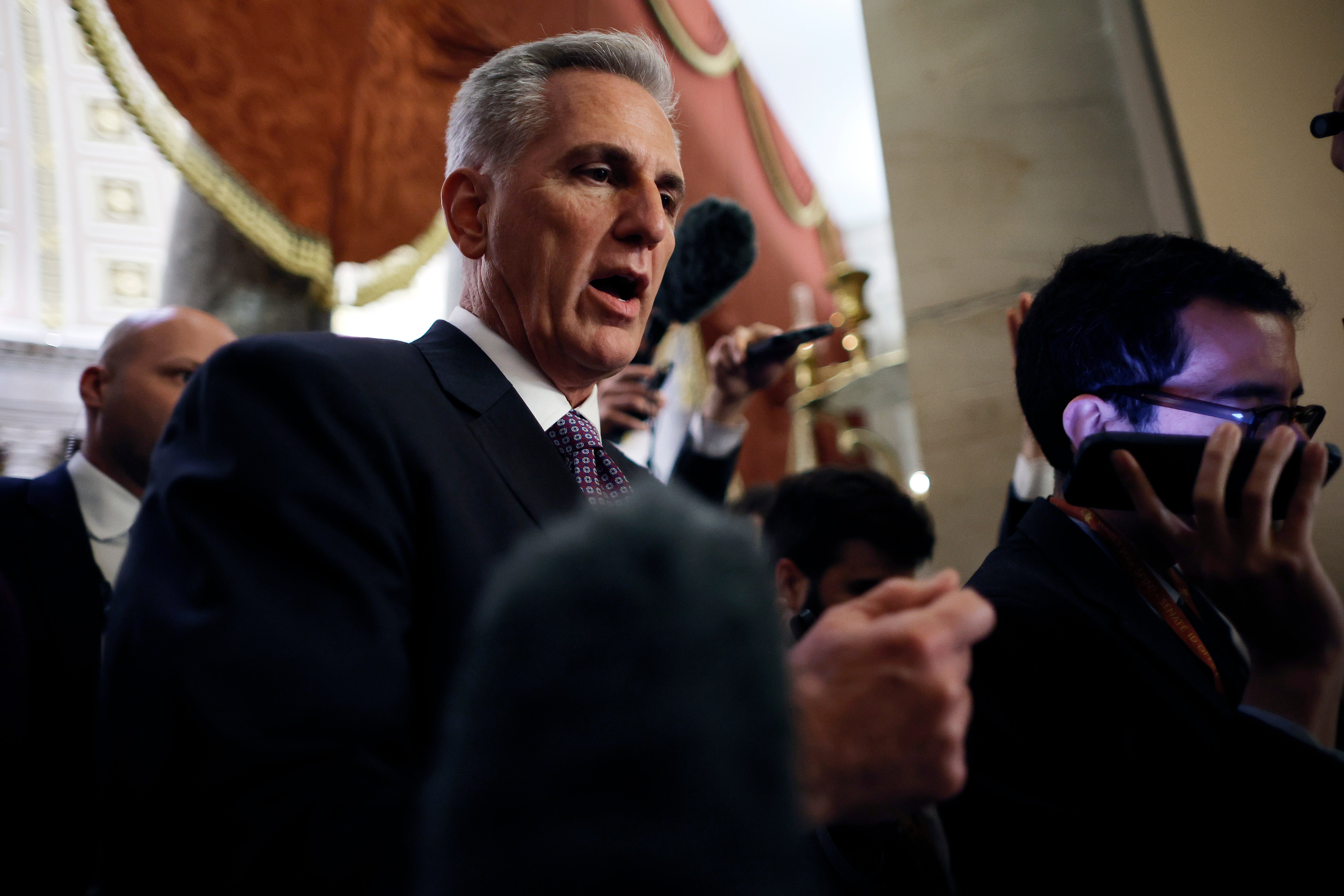Biden and McCarthy’s debt limit deal went through – but there are winners and losers
Student debtors and SNAP recipients will pay a price

The House of Representatives voted on Wednesday evening to raise the debt limit, with more Democrats voting to raise the limit than Republicans, and all but guaranteeing its passage in the United States Senate.
The vote served as a triumph for House Republicans as they moved the White House from initially wanting to have a clean debt limit increase to agreeing to some spending cuts. But 71 Republicans still opposed the agreement negotiated by the Biden administration and Reps Patrick McHenry (R-NC) and Garret Graves (R-LA).
Senate Majority Leader Chuck Schumer has said he hopes to pass the legislation quickly and before 5 June, when the Treasury Department says the United States will be unable to fulfill its debt obligations and risk defaulting on its debt.
This was the first major test for House Republicans’ resolve since they took control of the lower chamber in January after a protracted series of votes to get a speaker. Some conservatives crowed that the bill did not go far enough in spending cuts while House Republican leaders say they forced the White House’s hand. Conversely, progressive Democrats criticised the deal for putting in place work requirements for social welfare programs.
These are the winners and losers of the debt limit standoff.
Winner: Sen Joe Manchin (D-WV)
Even with a Republican House and an additional Senate seat, Sen Joe Manchin continues to have a profound impact on any piece of legislation. Throughout the deliberations, House Speaker Kevin McCarthy cited him. Mr Manchin has raised a ruckus in recent months, opposing the Biden administration’s nominees in response to the White House’s implementation of the Inflation Reduction Act, the signature law he brokered with Senate Majority Leader Chuck Schumer last year, which he says is too focused on promoting green energy alternatives.
But the debt limit agreement gave him a win when it included the approval of the Mountain Valley Pipeline, a natural gas pipeline that would span from West Virginia to Virginia. Mr Manchin had attempted to get the pipeline approved last year to no avail. But the approval also incensed many Virginia Democrats, including Sen Tim Kaine (D-VA), who proposed an amendment to strike the provision from the text.
Loser: SNAP Recipients between the ages of 50 to 54
Throughout the deliberations, Republicans insisted on putting in place work requirements for the Supplemental Nutrition Assistance Program, also known as SNAP and formerly called food stamps. While ultimately the agreement did not include work requirements for Medicaid, it raised the age for work requirements for able-bodied adults without children between the ages of 50 and 54. The legislation also reduces the number of exemptions that states can use for people who would otherwise be subject to work requirements and prevents them from carrying over exemptions for more than one year.
Winners: Foster care, veterans and people experiencing homelessness
While the legislation imposes new work requirements for able-bodied adults, it also exempts people who are experiencing homelessness, veterans and people between the ages of 18 and 24 who aged out of the foster care system from such requirements. The Congressional Budget Office estimated that when the work requirements and new exclusions are in effect, “approximately 78,000 people would gain benefits in an average month” between the 2025 to 2030 period.
Loser: Student debtors
When Republicans initially passed the Limit, Save and Grow Act in April, it rolled back the Biden administration’s student loan cancellation. That ultimately did not end up in the final bill. But Republicans did get the White House to agree to end the current pause on student loan payments that the Trump administration put in place during the Covid-19 pandemic. Student debtors will begin paying their loans at the end of August.
Winner and Loser: House Speaker Kevin McCarthy
The debt limit standoff was the California Republican’s first big test after a marathon 15 votes to earn the gavel in January. On one end, he moved the White House from its initial position of wanting a clean debt limit increase. He did so through an aggressive media and messaging strategy, often speaking to reporters both at the White House and again when he returned to the Hill. He put in place work requirements that Republicans have long wanted and dispatched two of his top negotiators. A majority of House Republicans also ultimately voted for the increase, meaning he did not break an internal House GOP rule.
But many conservatives rattled their sabres once negotiators announced they had reached a deal, such as the House Freedom Caucus, which includes many Republicans who had switched their votes in January after he made a series of side deals, many of them pertaining to the debt limit. And ultimately, 71 Republicans voted against the legislation, including some of his allies and more than just the rabble-rousers in the Freedom Caucus. He could face an internal rebellion in the coming months.
Winner and Loser: President Joe Biden
The president had some wins and some losses. Right out the gate ahead of his State of the Union Address, he got Mr McCarthy and House Republicans to take cuts to Social Security and Medicare off the table. His student loan forgiveness program remains intact and only a small amount of money allocated to the Internal Revenue Service in the Inflation Reduction Act will be cut in the final bill. Many of the other climate aspects in the bill remain in place as well.
At the same time, Mr Biden wanted a clean debt limit increase, which he didn’t get and had to negotiate with the House. He also failed to make the case to the American public about the need for the United States to fulfill its debt obligations and the risks of defaulting on its debt.
Join our commenting forum
Join thought-provoking conversations, follow other Independent readers and see their replies
Comments

Bookmark popover
Removed from bookmarks